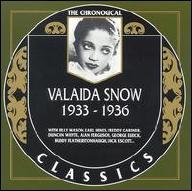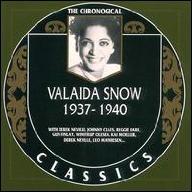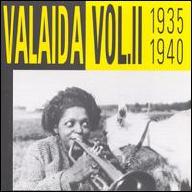By the age of 22, Snow was headlining Barron Wilkins' Harlem cabaret show, and throughout the remaining years of the 1920s she toured relentlessly, appearing throughout the U.S. in conjunction with the Will Mastin Trio and performing in London and Paris in the musical Blackbirds. In 1926 she toured the Far East, and in 1928 headlined Chicago's Sunset Cafe, where her energetic performances won the admiration of Louis Armstrong as well as Earl Hines, who soon became her lover. By the early '30s, Snow was starring in the Sissle/Blake revue Rhapsody in Black, and its success helped bring her to Hollywood, where alongside then-husband Ananais Berry she appeared in a number of films. By all rights Snow should have been a major superstar, but as a black performer she was subject to considerable racism; worse still, as a woman, she was an outsider even within the jazz community -- her perfect pitch, gifts for arranging, and brilliant trumpeting did not help her cause, but only made her that much more of a curiosity.
After headlining the Apollo Theater, Snow traveled back to Europe for more film work and live dates during the late '30s; however, in 1941, while in Nazi-occupied Copenhagen, she was captured by German forces and interned in a concentration camp in Wester-Faengle. She was freed as an exchange prisoner 18 months later and allowed to return to New York; tragically, Snow never fully recovered from the ordeal -- scarred psychologically as well as physically, she attempted to return to performing, but the spark was clearly gone, so much so that when Hines saw her appear live in 1943 he reportedly did not even recognize her. Following her marriage to manager Earle Edwards, she continued to work in spite of her personal suffering, but after playing the Palace Theater in New York on May 30, 1956, she died of a massive cerebral hemorrhage. Valaida Snow was 52 years old. ~ Jason Ankeny, Rovi

















